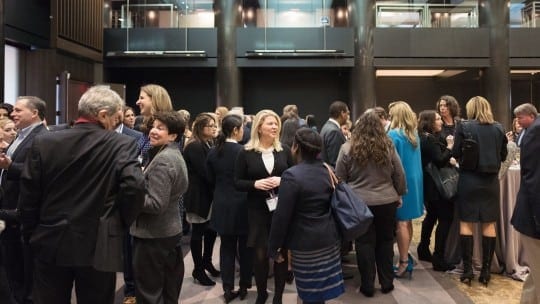
Networking might seem daunting, particularly for young PR professionals. What are the do’s and don’ts? How do you follow up? Does networking pay off?
The Dallas PRSA chapter's NuPros committee recently hosted an event that explored networking, informational interviews and memorable follow-ups. The edited remarks of the five PR pros on the panel are below.
Joey Mooring, senior director, corporate communications, GameStop
“I hate networking…I’ve meet a lot of fake people. I want you to be yourself, be who you are. It’s incredibly important. We all started our careers wanting to prove we are the next PR hot shots, but don’t be someone you’re not. We’re in the business of telling stories. We all have a story to tell, so tell me your story in your words. But, be aware. When the eyes start glazing over, it’s time to end the story. For every PR professional I met with before my college graduation, they gave me 2-3 other names. And, they asked me to pay it forward when the time came. To me, networking is my opportunity to pay it forward to those who connected me to the opportunities that impacted my career.”
Rachel Hedstrom, principal, The Gentry Agency
“Informational interviewing…is where you interview to learn about a person’s backstory, or agency…but you want to bring something to the table too. It’s OK to bring your portfolio and leave the interviewer with something to remember you by. After one of my first informational meetings, I sent the company a snow globe with my picture and its logo. There was an opening the next week, and I was the first one called. Ask if you can have an informational interview. It doesn’t have to be in-person, and may last only five minutes, but asking is the most important thing you can do. Networking is about what you can give back, not what you take. Ask yourself, ‘What can I learn from you, and how are we going to help each other in the future?’”

Jennifer Cho, EVP/GM, Weber Shandwick Southwest
“I am not a natural networker, but it’s necessary. I’ve used networking to land more than 90 percent of the jobs I’ve had…. Now, networking has turned into opportunities for recruitment for open roles at my agency. I have at least two informational meetings a week…it’s nice to know I may have people I can reach out to when it’s time to fill the roster. Also, I advocate for all PR professionals to attend their local PRSA chapter events. The benefits they learn will help clients and improve team collaboration.”
Meagan Camp, founder, The Modern Take/editor-in-chief, Ellis County Living Magazine
“Networking is like a muscle. The more you use it, the more you activate how to approach people…Think about your plan when walking into a room…networking is a way to learn how to talk about yourself in quick, interesting ways. Ask questions…be mindful of the type of events you attend. Think about networking outside of networking events…Find an organization that you’re passionate about with people working toward a common goal. Contribute to that success, and your work will build your portfolio and show your involvement in the community. This will help make you more three-dimensional in job interviews. One of my favorite icebreakers: “Where did you eat last?”
John Guccion, VP, commercial banking change communications, JP Morgan Chase
“Almost every job [I’ve had]…has been the result of networking. You need to find your style and comfort level. Ask open-ended questions to gather better information. I like to hear when professionals come to a networking event with an idea of what they’d like to get out of it. ‘What would you like to be more aware of, or educated about, when you leave?’ I’ll ask. Maybe they’re thinking about starting a business. That’s your icebreaker and goal: find someone in the room who has started a business or thought about it. I guarantee your conversation will stay with you. LinkedIn is the No. 1 tool to make the connection memorable. When sending a request, customize your message based on the conversation you had [while networking.] Follow-up in one week, or one month, to check-in and then go for that informational meeting.”
David Wolpert is a director at LDWW Group
